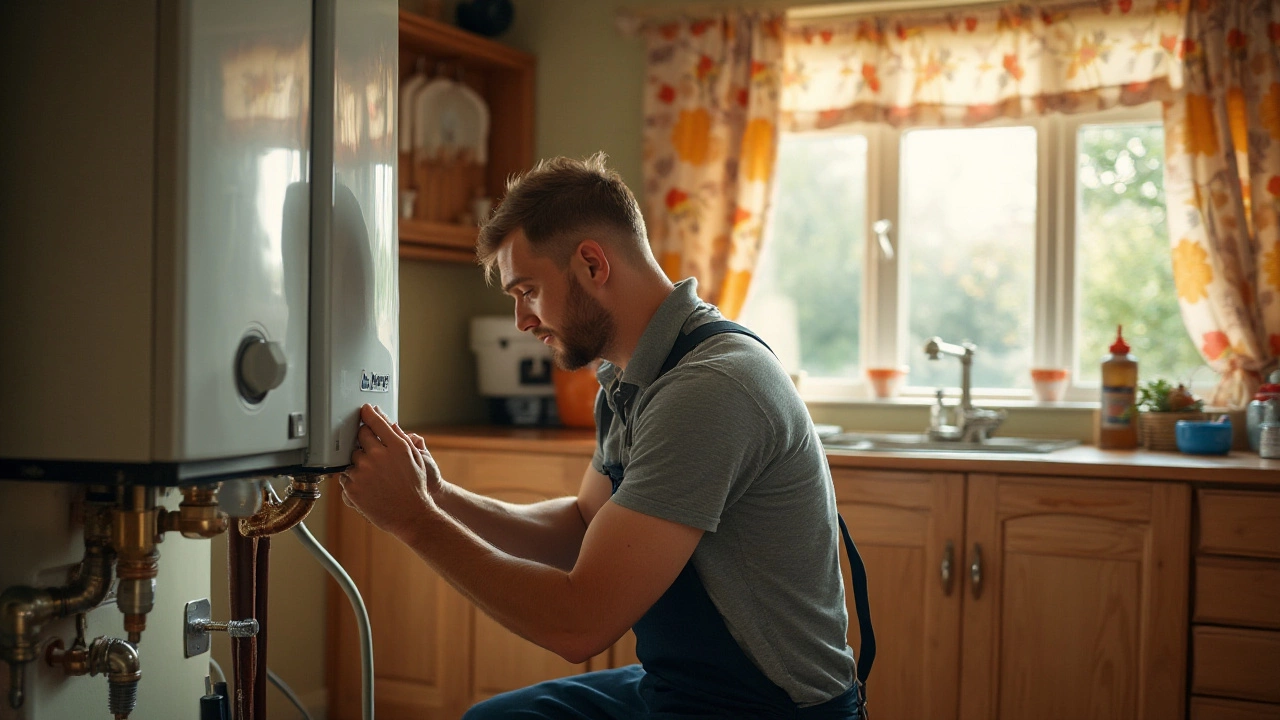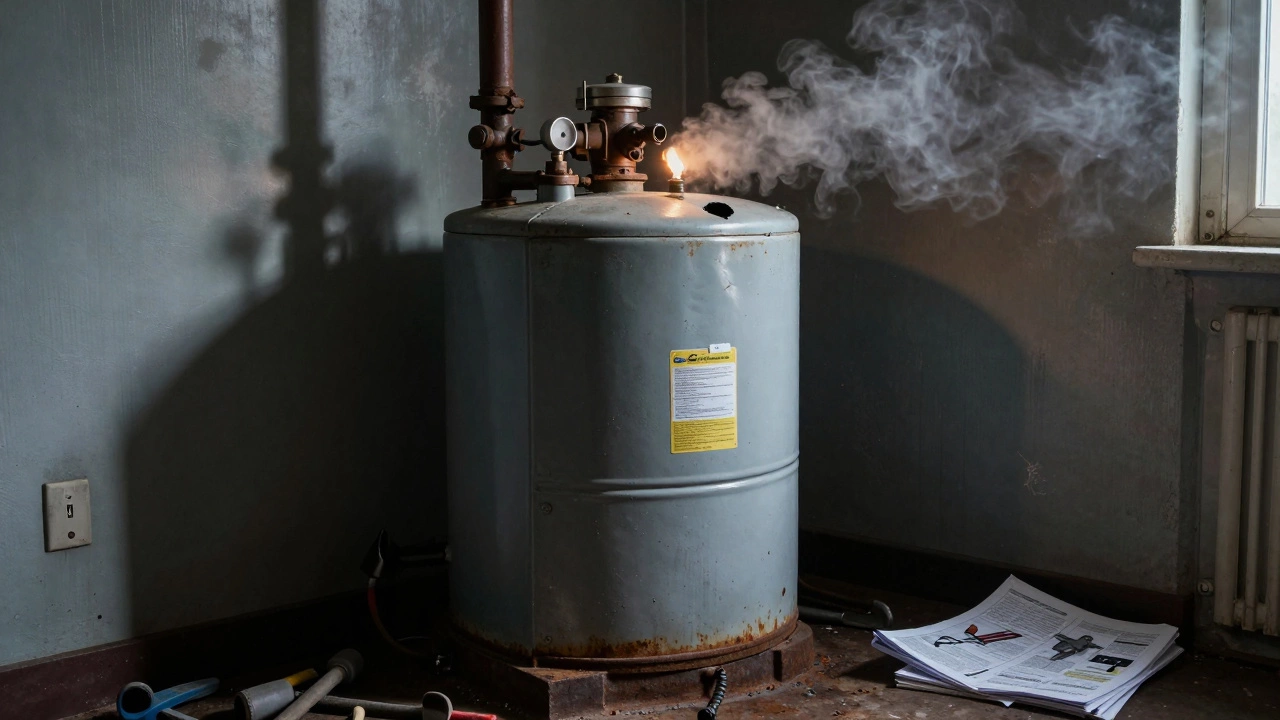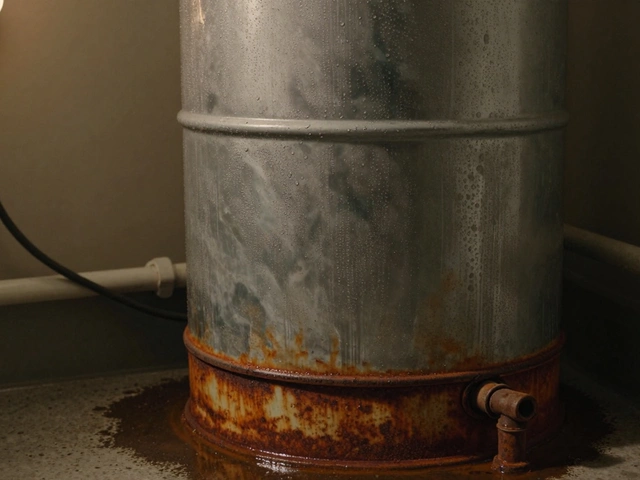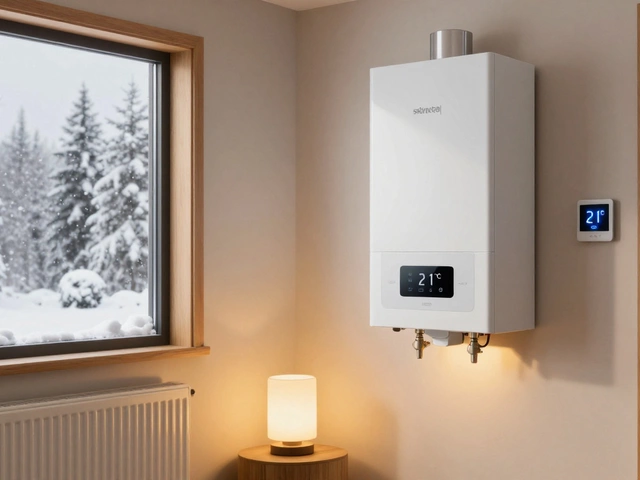Replacing a boiler is more than just swapping out an old appliance for a new one; it's a decision that impacts the comfort and efficiency of your home. When faced with a failing boiler or one that's simply too outdated to keep running efficiently, knowing how long the replacement will take is crucial.
This isn't just about sticking to your schedule; it's also about ensuring safety and finalizing an investment that should last for years. Yet, how long should you expect the replacement process to take? From the type of system currently in use to the expertise of the installer, several factors can influence this timeline.
To prepare yourself for the replacement journey and make the process as seamless as possible, it's important to grasp all the steps involved and perhaps even gain a few insider tips. Let's dive into what you need to know about replacing a boiler in your house.
- Understanding Boiler Replacement
- Factors Affecting Replacement Time
- Step-by-Step Boiler Installation Process
- Tips for a Smooth Boiler Replacement
- Choosing the Right Boiler for Your Home
Understanding Boiler Replacement
Boiler replacement might seem straightforward at first glance, but a deeper dive reveals a complex process that benefits greatly from careful consideration and expertise. A boiler serves as the heart of a home's heating system, silently working behind the scenes to ensure warmth and comfort through chilly months. The need for replacement usually arises when an existing boiler shows signs of inefficiency, starts leaking, or struggles to heat the household consistently. Homeowners often notice a spike in energy bills, which can prompt the search for a more energy-efficient model. Recognizing these signs early can prevent discomfort and potentially save significant costs in the long run.
The intricacies involved in replacing a boiler start with understanding the type of heating system currently in place. Common types include combi boilers, system boilers, and conventional boilers, each with distinct functionalities and installation processes. Combi boilers, popular in modern homes, combine a water heater and a central heating system in one unit, eliminating the need for separate hot water tanks. This makes them a compact and efficient choice for smaller homes. On the other hand, conventional boilers may be less efficient space-wise, yet offer a high volume of hot water, suitable for larger homes with multiple bathrooms. System boilers, borrowing elements from both, provide constant hot water supply and are compatible with solar heating systems, though they demand space for a hot water cylinder.
"When considering a boiler replacement, it's crucial to understand the advantages each system offers for your specific home setup," says energy expert Linda Reynolds of the Energy Saving Trust, emphasizing that knowledge is key to making an informed decision.
Before any work begins, a professional heating engineer will typically conduct a thorough assessment of the current system. They will evaluate the type of boiler currently installed, the layout of the house, and the capacity needs of the household. This assessment helps in determining the most suitable replacement options. It's important to engage skilled professionals who can anticipate potential complications during installation, such as outdated pipework or inadequate ventilation, to ensure the replacement is executed smoothly and safely.
Understanding the financial implications is equally important. Beyond the initial cost of purchasing a new boiler, which can range from several hundred to a few thousand dollars depending on the model and brand, installation costs also need to be factored in. These costs can be influenced by the complexity of the installation, which might involve additional plumbing work or upgrading parts of the old system to accommodate a new boiler. Fortunately, modern boilers are designed with energy efficiency in mind, which means they can eventually lead to savings on utility bills, making the investment worthwhile over time. For environmentally-conscious homeowners, switching to an energy-efficient boiler can significantly reduce a home's carbon footprint, contributing to a greener planet.
In summary, a boiler replacement involves more than just removing the old and fitting the new. It's about understanding the home's current heating needs, selecting the right type of boiler, engaging qualified professionals, and considering future energy savings. When approached thoughtfully, boiler replacement becomes an opportunity to enhance comfort and efficiency within a home, aligning with both immediate and long-term heating goals.
Factors Affecting Replacement Time
Deciding to replace your home boiler is just the beginning. One crucial aspect to understand is the timeframe involved, which can be influenced by a variety of factors. Recognizing these can help set realistic expectations and ensure a smoother process. To get you prepared here’s how different factors can play a role.
The type of boiler you're installing is perhaps the most significant factor. A simple like-for-like replacement, where the new boiler is a direct model upgrade, is usually the quickest route. This might take a day or two, primarily because the existing infrastructure within the home already aligns closely with what's needed. However, if you're switching systems, say from a conventional boiler to a combi boiler, it will undoubtedly require more time and labor. This is mainly due to adjustments that need to be made to the central heating system, including pipework modifications and possibly even the layout of your home's heating system.
Installation Complexity
Another dimension is the complexity of the installation. A straightforward replacement with easy accessibility and no major obstructions allows technicians to work more swiftly. Conversely, older homes may present unique challenges with the existing pipework that could add a day or so to the timeline. For instance, if the system is based in a cramped loft space, technicians might need additional time for safe access and maneuvering.
"When assessing replacement duration, account for the boiler type, location, and potential unforeseen complications," advises Daniel Thorne, lead engineer at HeatTech Solutions.
Custom Upgrades
Opting for custom upgrades such as thermostatic installations or smart heating controls can also extend the installation time. Although these add-ons enhance efficiency and convenience, integrating them properly into the new system requires additional expertise and patience. That said, the payoff of a modernized, customizable heating system is often well worth the added time.
The condition of your current setup also plays a role. For instance, if the existing venting systems or ductwork are unsound, they will need fixing or replacing which will inevitably add to the timeline. Water damage, rusted connections, or historical DIY fixes can also necessitate extra repairs and modifications.
Conversion of Fuel Sources
Additionally, changing the fuel source, such as from oil to natural gas, can significantly increase installation time due mainly to the necessity of arranging new fuel lines and ensuring compliance with local regulations. The planning stage for this alone can span quite a period before the actual hands-on work even begins.
| Factor | Average Time Increase |
|---|---|
| Like-for-like replacement | 1-2 days |
| System switch or upgrade | 3-5 days |
| Complex installation environment | Extra 1-2 days |
Not to be overlooked is the professional team you choose to hire. Reputable, experienced contractors bring not only reliability but often a quicker turnaround time thanks to their adept problem-solving skills and familiarity with a range of products. It's vital to discuss thoroughly with your chosen contractor about any potential disruptions or additional work that could affect the installation duration.

Step-by-Step Boiler Installation Process
When it comes to the boiler replacement journey, understanding the step-by-step process involved is crucial. Each stage involves meticulous planning and precision to ensure safety and efficiency. To begin with, the initial assessment is an important point of action. A professional heating engineer typically starts by evaluating the current heating system and existing pipework. This step helps identify any potential challenges such as outdated infrastructure or problematic placements which may extend the installation time. It's at this point they also determine the suitable size and type of home boiler needed, ensuring it's appropriately matched to your household requirements.
Once the assessment is done, the old boiler needs to be removed. Shutting down the existing unit involves careful disconnection from the power and water lines. The professional ensures all safety guidelines are followed thoroughly to prevent leaks or electrical hazards. Depending on the intricacy of the setup and accessibility of the old unit, this stage can take a few hours to a day. If pipework alterations are required, it could extend the process further. It's quite common for engineers to discover old or faulty connections which need fixing before proceeding further.
The next phase involves laying down the groundwork for the new boiler installation. This step might require updating existing connections and ensuring that the mains gas pipeline adheres to current regulations. Installing new pipework, updating radiators, or fitting smart thermostats are regular tasks that the engineer might also take on during this stage. Modern boilers often come with added functionalities such as smart control systems, so the installers ensure all technical aspects are correctly integrated and operational. A typical installation, barring any complications, takes about one to two days.
After the physical installation of the unit, the system needs to be filled, vented, and pressurized. Engineers cleanse the system and treat it with inhibitor chemicals to protect against future limescale and corrosion buildup. Completing this ensures the longevity of the new system. It is also a standard procedure to check for leaks, secure wiring, and test the overall functionality. During the testing phase, adjustments are made as per the required efficiency levels to ensure the new boiler system is tailor-fit to your home environment.
According to the Energy Saving Trust, "Replacing an old gas boiler with a new modern one and improving your home's energy efficiency can save you between £200 and £350 a year." This highlights not only the economic benefits but also the importance of paying close attention to the processes involved.
Finally, the last element in the installation process is educating the homeowner. The installer will take time to explain how the new system works, offering guidance on operating the thermostats and any smart controls in place. They typically provide maintenance tips to enhance the lifespan of the boiler and optimize energy use. Understanding these functionalities helps homeowners manage the system effectively over time, noticing any issues early and potentially saving on costly repairs.
Tips for a Smooth Boiler Replacement
When embarking on the journey to replace your home boiler, preparation is key to ensuring a seamless process. Start by researching the type of boiler that best suits your needs and the layout of your home. There are various options available, from combi boilers, which offer efficiency by heating water on demand, to system boilers that might better serve households with higher hot water needs. Consider consulting with a heating specialist who can provide insights based on your specific requirements and help navigate through the energy efficiency ratings of different models. After all, upgrading to an energy-efficient boiler can lead to significant savings in the long run, reducing heating bills by up to 30% in some cases.
Communication with your installer plays a pivotal role as well. Before the work begins, have a detailed discussion about what the installation will entail, the expected timeline, and any potential challenges that might arise. Keeping this line of communication open helps manage expectations and prepares you for any adjustments needed during the installation. Many professionals are more than willing to provide a comprehensive overview, and some might even offer a new perspective or advice you hadn't considered. As the installation of a new heating system often involves disrupting your home environment for a while, planning for this eventuality, such as arranging an alternative heat source if the work stretches over colder days, is worthwhile.
It’s wise to also inquire about the removal and disposal of the old boiler. Contractors typically include this service, but it's always better to confirm beforehand to avoid unexpected costs or hassles on the day of replacement. Moreover, asking about the post-installation checks and demonstrations can ensure you’re fully equipped to handle your new boiler from day one. Understanding the control system and scheduling a follow-up session to answer any post-installation queries can provide long-lasting benefits. A key element here is also hiring a reliable installer. In today’s market, an installer’s credentials and previous customer reviews can make a substantial difference in the experience and outcome of your boiler replacement.
“A smooth boiler replacement starts with selecting the right team for the job. Trustworthy professionals will always prioritize safety and efficiency during installation,” advises Jonathan Scott, a seasoned heating expert with decades of experience in the field.
Your preparation continues even after installation. Regular maintenance and understanding warranty terms are crucial to maximize your new heating system's lifespan and performance. Setting up a maintenance schedule with your installer not only ensures your system operates safely but also helps maintain its efficiency. Keeping boiler components like pressure gauges and thermostats in check can prevent unforeseen issues. As technology evolves, many modern boilers come equipped with self-diagnostic systems that alert homeowners to potential issues before they escalate, allowing for timely intervention and resolution.
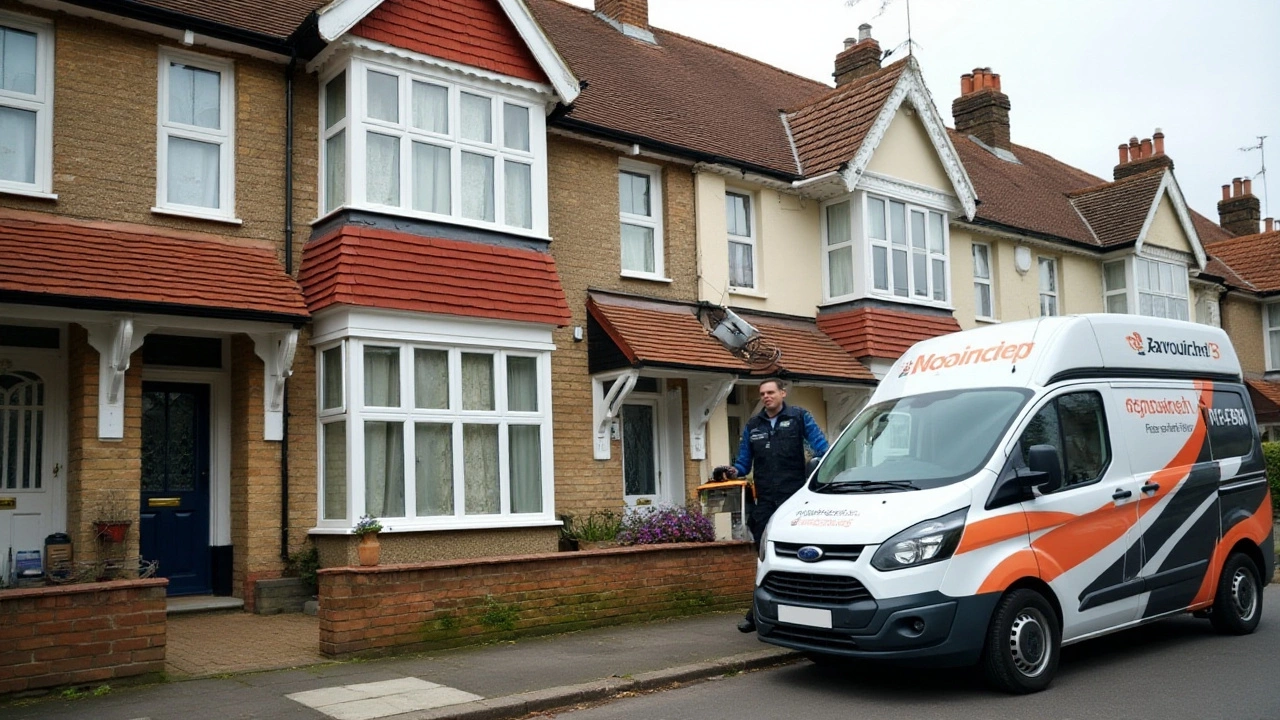
Choosing the Right Boiler for Your Home
Deciding on the right boiler for your home goes beyond just opting for the latest model on the market. It requires careful consideration of several factors to ensure that the unit will adequately meet your household's heating needs efficiently and effectively. The market offers different types of boilers—such as combi, system, and conventional—each catering to specific demands and property sizes. Understanding the differences is crucial, as it directly affects both the comfort and economic efficiency of your living environment. For smaller residences or apartments, a combi boiler is often the preferred choice due to its space-saving compactness and on-demand hot water capability. In contrast, larger homes with multiple bathrooms might benefit more from a system or conventional boiler, which can handle simultaneous uses more effectively.
When selecting a boiler replacement, it is important to look beyond the initial purchase price. Take energy efficiency into account, as it can drastically reduce your long-term utility bills. A-rated high-efficiency boilers might demand a higher initial investment but could save considerable amounts over the years due to reduced energy consumption. Another pivotal element is fuel type. Most households rely on gas, but those without access might find oil or LPG boilers to be suitable alternatives. It's worth checking if there are renewable options, like biomass boilers, which offer an environmentally friendly choice, though they may require more space for fuel storage. Also, you'll need to think about the specifications of your home, such as water pressure specifically for combi boilers, and existing pipework compatibility to avoid additional installation costs.
"Taking the time to properly assess your household's specific heating demands can not only influence the efficiency of the heating system but can also contribute to significant savings on energy expenditure," suggests John Dawson, a veteran in HVAC systems.
Engaging with professionals for a home assessment can be highly beneficial. An expert can guide you through the nuances of each boiler type and recommend the most appropriate system for your home's size, layout, and personal preferences. Additionally, consider the warranty and post-installation services that are available for the boiler models on your shortlist. A reliable warranty can be a lifesaver, covering unforeseen issues that might arise, thereby offering peace of mind. Apart from that, look for trusted brands with a reputation for durability and efficiency. Opting for a cheap yet less reliable brand might save in the short term but can lead to frequent issues later on.
With such a variety of options to weigh up, thinking through your choice carefully enables you to harness the benefits of an efficient heating system tailored to your home’s specific needs. Always remember—to future-proof your investment, stay informed about technological advancements and emerging trends in the heating industry. Smart heating systems are becoming increasingly popular, providing enhanced control and potentially even greater savings.
